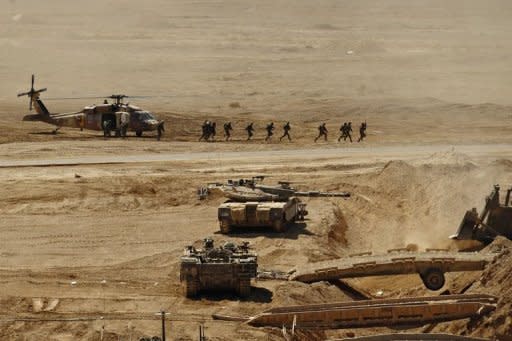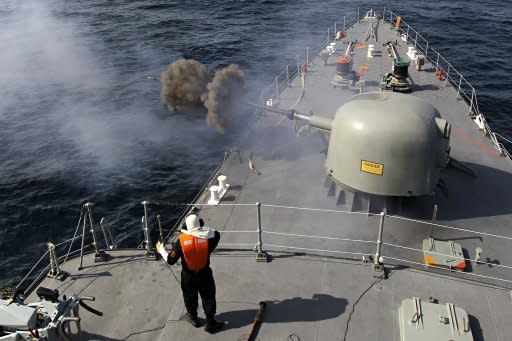Major US-Israel military drill postponed
Israel and the United States have agreed to postpone a major military defence exercise scheduled for spring, a senior security official said Sunday, amid rising regional tension over Iran's nuclear programme. "Israel and the United States have agreed to postpone the manoeuvre planned for spring," the official said on condition of anonymity. "The exercises will take place between now and the end of 2012," the official added, without elaborating. Earlier, public radio said the "Austere Challenge 12" exercise would be pushed back to the end of 2012 over unspecified budgetary concerns, citing military sources. Army radio, citing a defence official, said it was being postponed to avoid "unnecessary headlines in such a tense period." The joint manoeuvre was to have been the biggest yet between the two allies, and was seen as an opportunity to display their joint military strength at a time of growing concern about Tehran's nuclear ambitions. Israel, the United States and much of the international community accuse Iran of using its nuclear programme to mask a weapons drive, a charge Tehran denies. The postponement appeared to suggest fears the exercise could dangerously ramp up regional tensions, at a time when Iran has already threatened to close the strategic Strait of Hormuz -- a chokepoint for one fifth of the world's traded oil -- in the event of a military strike or severe tightening of international sanctions over its nuclear programme. Meanwhile, the United States sent Iran a letter over its threatened closure of the Strait of Hormuz, the Iranian foreign ministry spokesman said Sunday, without revealing the letter's contents. "The US ambassador to the UN, Susan Rice, sent a letter to Mohammad Khazaie, Iran's UN representative, which was conveyed by the Swiss ambassador, and finally Iraqi President Jalal Talabani delivered its contents to officials" in Iran, the official IRNA news agency quoted Ramin Mehmanparast as saying. "We are in the process of studying the letter and if necessary we will respond." Last month, the Israelis insisted the joint manoeuvres were planned in advance and denied they were related to Iran. "The exercise scenario involves notional, simulated events as well as some field training and is not in response to any real-world event," the military told AFP. The postponement was not expected to affect a visit to Israel by top US military chief General Martin Dempsey, who is scheduled to arrive later this week and meet with Israel's Defence Minister Ehud Barak and Chief of Staff Benny Gantz. But the delay was announced as reports suggested unease in US-Israeli relations over the best response to Iran's nuclear programme, and after an Israeli official voiced "disappointment" at Washington's approach. Washington has spearheaded a push for international sanctions against Iran, including on its oil exports and financial institutions. But Israel's Strategic Affairs Minister Moshe Yaalon told public radio he thought US President Barack Obama's administration should be tougher. "France and Britain understand that the sanctions must be strengthened, in particular against the Iranian Central Bank," Yaalon said. "The US Senate is also in favour, but the US government is hesitating, fearing higher oil prices in an election year," Yaalon said. "It's disappointing." Deputy Foreign Minister Danny Ayalon, speaking Sunday ahead of a trip to Britain, also accused the international community of dragging its feet. "It is regrettable that the international community has not yet used all the means at its disposal to stop the Iranian nuclear programme," he told public radio. Israel has made no secret of its desire to see crippling sanctions imposed on Iran in a bid to slow its nuclear development, and reports suggest it has also taken other actions to delay the programme. The Jewish state is suspected of involvement both in a computer worm that reportedly set back Iran's nuclear efforts, as well as a campaign of assassinations of Iranian nuclear scientists. Media reports have pointed the finger at Israel's intelligence agency Mossad. Foreign Policy magazine reported that Israel's actions had created friction with Washington, and the Wall Street Journal said on Friday US officials had warned Israel against unilateral military action against Iran. Yaalon said Sunday that a military strike remained a last resort for Israel. "Israel must defend itself. I hope that we will not arrive at that point," he said.




